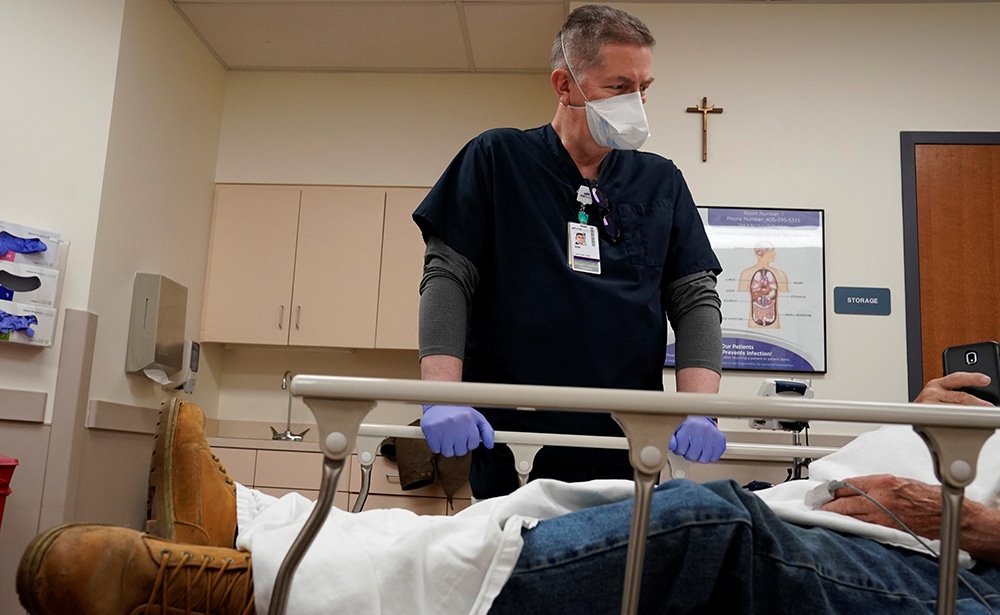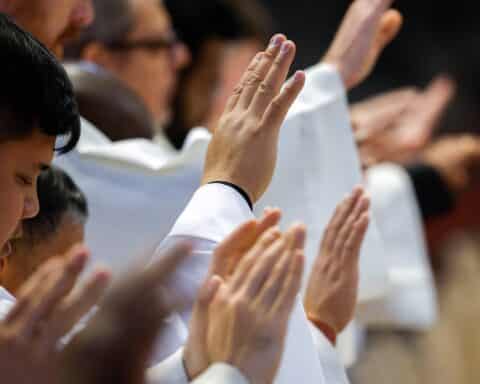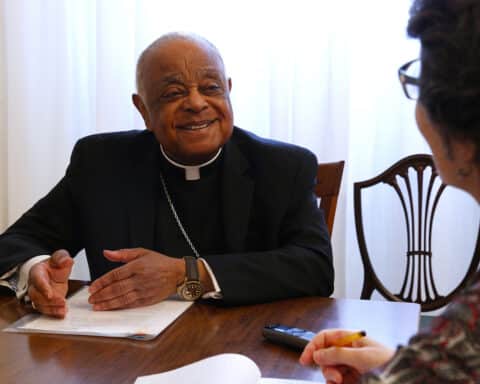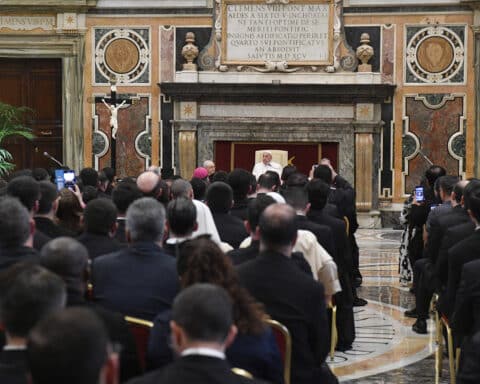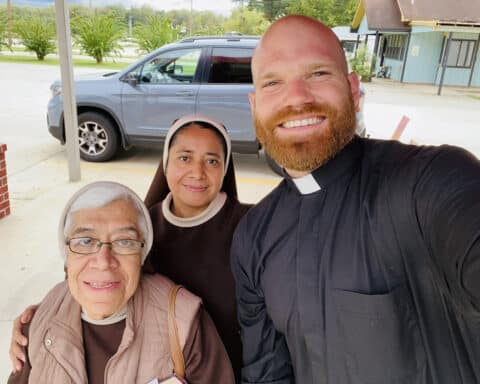In the Lakeview neighborhood of Chicago, Father Michael Trail stays plenty active serving as the associate pastor at Our Lady of Mount Carmel Catholic Church. His life got a little more busy around a couple of months ago when he signed up to serve in an usual role. He is one of roughly 24 priests in the Archdiocese of Chicago who have volunteered to offer the Sacrament of the Anointing of the Sick to those dying from the coronavirus.
“I don’t see myself as special in all this,” said Father Trail, 30. “This is my priestly ministry. This is what I was ordained to do.“
Father Trail said the anointings have been nothing like they were before the coronavirus pandemic struck. First and foremost, there are the precautions he’s had to take by wearing personal protection equipment.
“While we received training and equipment from the archdiocese when this started, I have been typically met at the door (of the facility) by a nurse or an aide who tells me how to put the equipment on,” he related. “There is an order to which it needs to go on and off. I am very grateful for that, and it has eased any anxiety I have had. They do this everyday and clearly know what they are doing.”
Once he gets to the bedside of the dying patient, he is faced with another new reality.
“Whereas before I was holding the hands of the person and praying with them and the family, now I am alone, standing at a distance with a face shield on,” he told Our Sunday Visitor.
For the actual anointing, Father Trail added that he now uses gloves and a cotton ball with a dab of the sacred oil on it as to prevent any direct contact with the patient.
“It is strange,” he said. “But I am grateful that I am able to be there, and we are doing the right thing by taking all the precautions necessary.”
Fifteen miles away, on the south side of Chicago at St. Columbanus Church, Father Matt O’Donnell tells a similar story. Given his age (33) and with no known health concerns, he said he was happy to volunteer his services when asked by the archdiocese to serve as on its COVID-19 unit.
“The experience has been very powerful,” Father O’Donnell said. “Offering the anointing of the sick has been life-giving and humbling to me. When I am there, I am one of the few people who have been able to visit this person.”
Father O’Donnell noted that one of the differences in his hospital visits now is he is “all business.”
“We have been encouraged to limit our time in the room with the patient,” he said. “Instead of sitting down and talking to the patient and getting their story as I would in the past, it has been about saying the prayers, anointing them with the oil, blessing them and leaving. I am in and out.”
A welcomed presence
Father O’Donnell said that he makes it a point to thank hospital and nursing staff personnel for their tireless service wherever he visits and offers them a word of encouragement.
“In this moment, just being present to the hospital and nursing home staff is really important to me,” he said. “These places are on lockdown. It is not business as usual. The doctors and nurses are extremely busy, and you can sense an urgency or tension in the air.”
In the Archdiocese of Newark, New Jersey, Father Peter Iwuala has been trying to ease that tension with prayers on the hospital’s intercom system at Clara Maass Medical Center in Belleville, New Jersey, where he serves as the chaplain.
“I say prayers one or two times a week through the overhead, and both patients and staff have told me that they like this, and it brings them spiritual comfort,” he said.
At Mountainside Medical Center in Montclair, New Jersey, also in the Archdiocese of Newark, Father Thomas Cembor, who has served as the director of pastoral care at the facility for the past 13 years, walks the floors of the medical center praying Hail Marys along the way.
“When I am requested to by family, I gown-up like the pros, enter the secured doors and anoint those too weak to recover with the sacred oils and the words of God’s forgiveness,” he said.
“Before COVID-19, the doors to the rooms here were open and inviting visitors in. I greeted so many patients each day and directed dedicated Eucharistic ministers to do the same. In these days of the coronavirus, my energies are spent offering a word of cheer and comfort to an overworked and overwhelmed medical staff,” Father Cembor said.
Peace to families
In the Archdiocese of Seattle, Father Patrick Sherrard told Our Sunday Visitor that one of the most difficult aspects of this COVID-19 ministry is the absence of the families at the bedsides of their loved ones.
“The saddest part of this is that the families feel disconnected from their loved ones who are dying,” said Father Sherrard, who is the administrator at St. Catherine of Sienna parish in Seattle. “I have made it a point to call the families of those dying after my visits and give an update. I call them and explain to them what I did and that I was praying for them,” he said. “The families are very grateful that their loved ones received the sacraments, as that is what they would have wanted.”
In Chicago Father O’Donnell has adopted a similar practice.
“From my experience, and from the other priests I have spoken to, the families of the sick and dying are suffering greatly,” he said. “To not be able to see their loved ones and, moreover, to not be there physically to offer comfort in those moments has been extremely difficult.”
He noted that the hospitals and nursing home facilities are able to ease distance between loved ones with video technology, but it is not the same as physically being there.
“I share what happened with a family after a visit,” Father O’Donnell said. “I call and tell them that their loved one was sitting up, or we talked, or we mouthed a prayer together,” he said. Families have told me that hearing that from a priest gives them a real sense of comfort. They are grateful that we are simply there.”
Father O’Donnell explained that he has made it a point to stay in touch with the families long after the visit.
“I just want to let them know that I am thinking about them, praying for them and offering Mass for them and their loved ones.”
With that in mind, he said that the healing that will need to occur from this pandemic and quarantine will take a long time.
“The Church will still have a very important role to play even when the country reopens, as we will need to keep giving people a sense of hope and peace that God was always with us in these difficult times — and will continue to be.”
Eddie O’Neill writes from Michigan.

